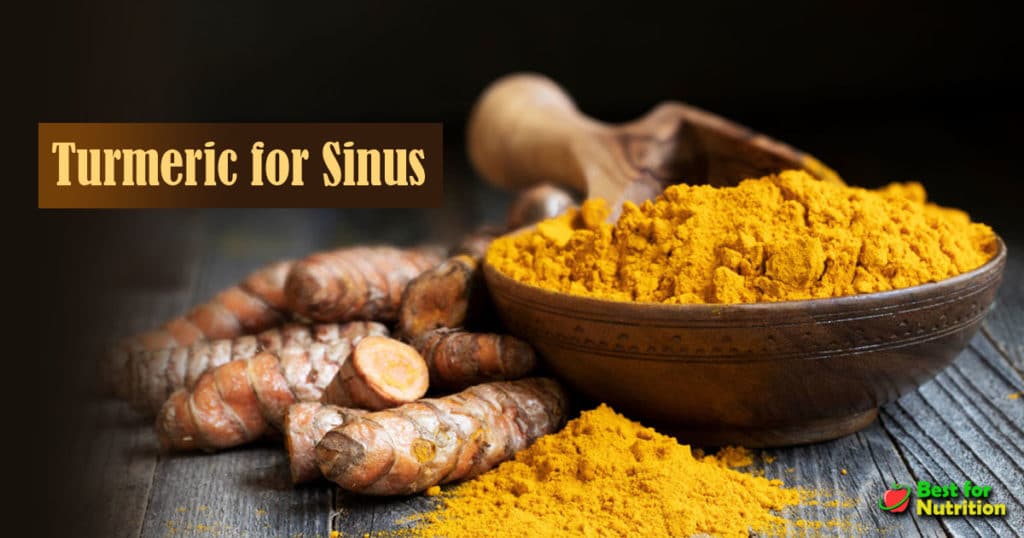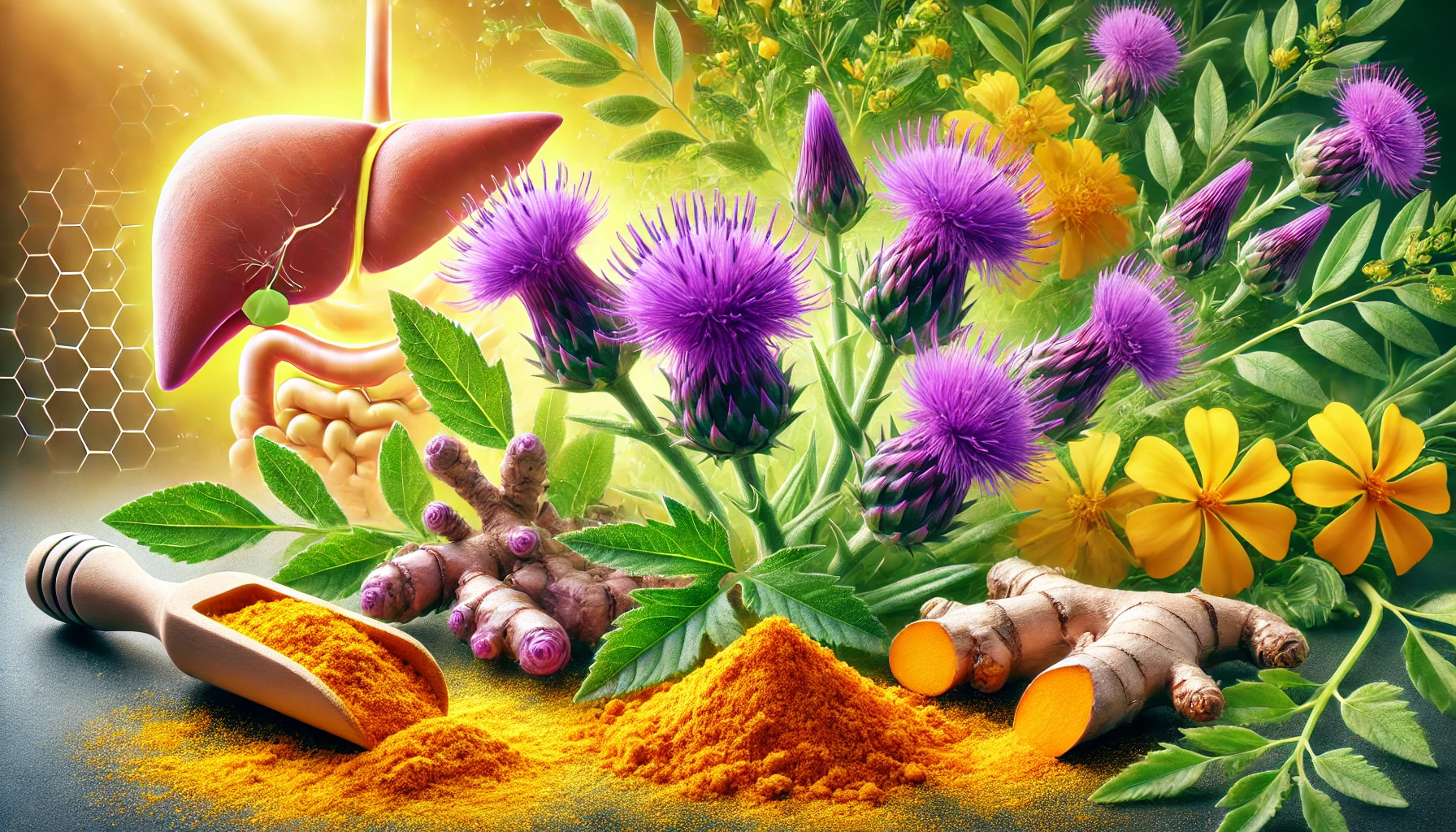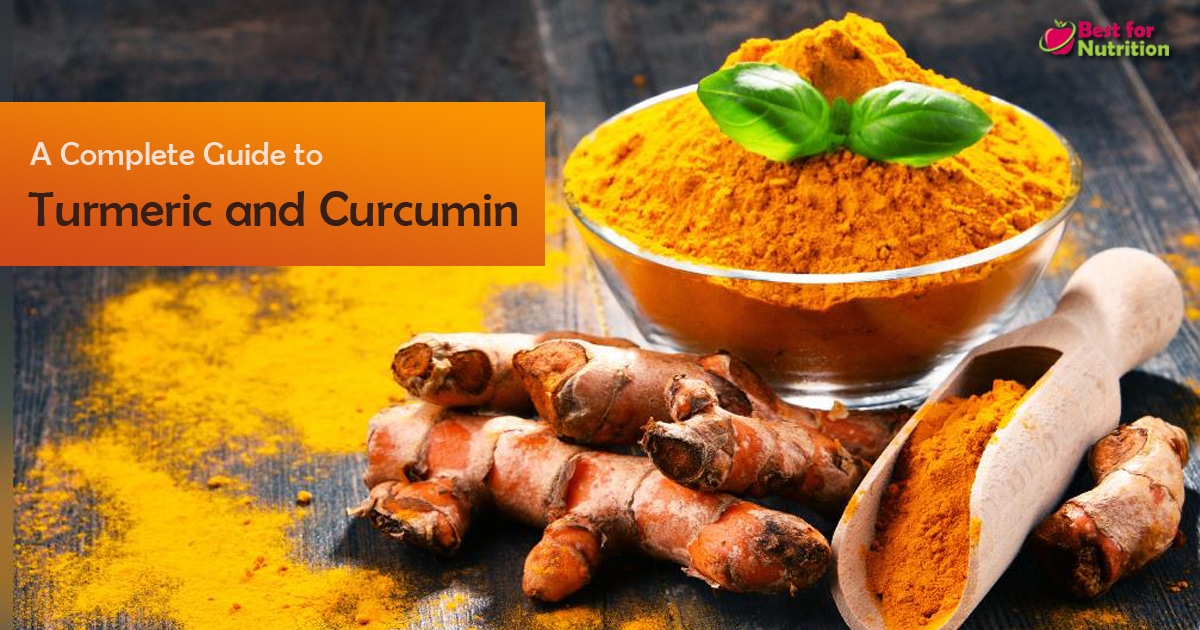Turmeric for sinus infections is a natural home remedy that has been practiced for centuries.
Turmeric is an amazing spice that not only adds aroma and color to food, it is also known for its wondrous medicinal properties.
With its anti-bacterial and anti-inflammatory powers, turmeric has proven to be useful in treating many health conditions.
Read on to learn how turmeric works to relieve sinus symptoms. Also learn how you can use turmeric to treat nasal congestion, as well as, the right dosage of turmeric for sinus relief.
- Turmeric for Healing
- What is Sinus Infection?
- The Effect of Blocked Sinuses
- Symptoms of Sinus Infection
- Treatments for Sinus Infection
- Can Turmeric Help in Sinus Infections?
- How to Use Turmeric for Sinus Infections?
- How to Use Turmeric for Nasal Congestion?
- What to Eat & What to Avoid in Sinusitis?
- Other Natural Home Remedies for Sinusitis
- The Risks and Side Effects of Excessive Turmeric

Turmeric for Healing
Turmeric (Curcuma longa) is mainly found in India, which gives it the name Indian Saffron. This flavorsome spice is cultivated from the rhizomes (roots) of a flowering plant.
Its active component includes curcumin, which is responsible for its characteristic yellow color. Moreover, curcumin endows turmeric with several health benefits (1).
Along with imparting a vibrant yellow color to different dishes, turmeric is known for its anti-inflammatory, antibacterial, antioxidant, and antibiotic properties (2).
Hence, it finds its application for medicinal or healing purposes including its use for sinus infection.
What is Sinus Infection?
Our nose has air-filled cavities on either side. These cavities are known as sinuses. Sometimes, they are clogged or infected due to cold, allergies, bacterial infections, or other external causes.
This infection is generally caused by a virus and usually persists even after the complete withdrawal of upper respiratory symptoms.
This condition is medically termed as rhinosinusitis, which is known as sinus infection in general (3).
The condition when nasal cavities become inflamed, infected, or swollen is referred to as sinusitis. This, in turn, leads to several health problems such as headaches or difficulty in breathing. In some cases, sinusitis can cause brain fever or meningitis.
The most common types of sinus problems are as follows:
- Recurrent Sinusitis: It refers to sinusitis that occurs frequently (recurrently) in a year.
- Chronic Sinusitis: The sinusitis that lasts for 8 to 10 weeks or longer falls under chronic sinusitis.
- Sub-acute Sinusitis: The sinusitis with a suffering period of 4 to 8 weeks is termed as sub-acute sinusitis.
- Acute Sinusitis: It is a type of sinus infection having a suffering period of 4 weeks or less (4).
Summary: The condition in which the nasal cavities become infected is termed as a sinus infection. Sinusitis is generally caused by the virus but in some cases bacteria, allergies, or cold.
The Effect of Blocked Sinuses
One of the major effects of blocked sinuses is sinus headaches. Such headaches are typically constant and throbbing. The headache is the result of constant pressure that is applied across the entire head due to inflamed sinuses.
Sinus headaches can also cause pain in ears, nose, eyes, cheeks, teeth, as well as forehead. Sinus infection can cause discomfort to the natives and affect the quality of life (5).
Fortunately, some home remedies can provide instant relief from sinusitis. But before jumping into that, let’s find out how you can diagnose sinus infection.
Summary: Blocked sinuses primarily cause severe headaches which is because of the constant pressure on the head because of inflamed sinuses.
Major Symptoms of Sinus Infection
There are different signs and symptoms of sinus infection. The chief symptoms are listed below:
- Acute headaches that increase when one bends down
- Facial swelling or tenderness over sinus areas
- Pressure or pain caused due to mucus pressing
- Fever due to inflammatory sinus tissues
- A discolored, cloudy, and thick nasal drainage
- Nasal congestion
- Post-nasal drip (mucus overproduction that flows from the nose to the throat and irritates the inner throat areas)
- A sore throat caused by postnasal drip
- Cough
- Toothache, eye pain, and ear pain due to the pressure on the surrounding areas (6)
Summary: The major symptoms of sinus include headache, fever, nasal congestion, sore throat, and severe pain in different parts of the face.
Treatments for Sinus Infection
Sinus infections can be treated with common medications that don’t need any prescription. The use of decongestants can provide some relief in reducing the inflammation of sinuses.
The decongestants work by restricting the blood flow in the nasal cavities. You can also use pain relievers to reduce sinus headaches. Moreover, if your infection is related to allergies, then antihistamines can be used to reduce the effects.
Summary: Sinus can be treated by simply taking decongestants or pain relievers. The patient may be required to take antihistamines in case of an allergy.
Can Turmeric Help in Sinus Infections?
Turmeric is considered a magical spice. Much before the medicines were invented, our ancestors relied on this spice for many health benefits. One of the many health benefits is the use of turmeric for sinus.
Although there aren’t too many scientific pieces of evidence and researches that validate that turmeric is able to treat sinus infection, yet it has shown effectiveness in reducing/preventing it. Hence, people across the world use turmeric to get relief from sinusitis.
The active component of turmeric, curcumin is anti-inflammatory. As sinus infections are caused by nasal inflammation, curcumin in turmeric has the ability to clear and heal the nasal cavity thereby providing relief (7).
Summary: Curcumin present in turmeric has anti-inflammatory properties. Therefore, it can heal the nasal cavity and reduce the infection.
How to Use Turmeric for Sinus Infections?
You must have heard that too much of anything is dangerous. On the other hand, anything taken in a meager amount won’t yield optimal results.
Hence, turmeric should be taken in the right dosage to reap its benefits against sinus infection. But, what is the ideal dosage of turmeric? Let’s find out!
Traditionally, 500mg to 3000 mg of powdered turmeric root is used for leveraging its medicinal benefits (8). Most curcumin supplement manufacturers recommend a daily intake of one to three capsules of 500mg.
It is always better to get advice from your doctor, as they will be able to recommend the right dosage after taking into account your medical conditions. If you want to use turmeric for sinus infections, then here’s the health formula:
- It is best to use pure turmeric roots. They are available at local herbal stores, raw food stores, or grocery shops.
- You have to take two pieces of turmeric roots and mix them with one lemon, one tablespoon of honey, cayenne pepper, and some water.
- You can also add a banana to your turmeric smoothie for extra flavor.
This remedy is very effective in treating sinusitis. Many people experience complete improvement within 3-4 days of drinking it. Moreover, it also works even if your sinus is present for more than 3 weeks.
Summary: A rhinosinusitis patient should consume about 0.5 to 3 grams of turmeric daily. To use, take two pieces of pure turmeric roots and mix them with lemon, honey, cayenne pepper, and water.
How to Use Turmeric for Nasal Congestion?
In sinusitis, the nasal tissues are inflamed, which results in blocking of the airways. Due to this blockage, the excess mucus is trapped in the sinuses, which develops a perfect environment for bacteria and viruses.
As the trapped mucus is stagnant, it exerts enormous pressure on the surrounding areas known as nasal congestion (9).
To relieve the nasal congestion in a sinus infection, you can use any of these remedies:
Turmeric and Ginger for Sinus
You can use turmeric in conjunction with ginger for nasal congestion. For this, you should procure pure turmeric and ginger root. You can then brew some pieces of spicy ginger and turmeric in hot tea.
The marvelous combination of ginger and turmeric can assist in loosening mucus from the blocked nasal cavities.
Turmeric and Honey for Sinus
You can also use turmeric and honey for sinus. For that, you just have to prepare a mixture of one tsp of honey and fresh ginger juice. You can consume the mixture 2 to 3 times a day.
This remedy can also work magically for sinus infections. However, if you are experiencing nasal congestion for more than 10 days, then it must be considered as a red flag and should be treated by a doctor.
Summary: For treating nasal congestion you can consume turmeric in combination with either ginger or honey.
What to Eat & What to Avoid in Sinusitis?
Along with using turmeric for sinus infection, your diet can also help you in preventing sinus infection. It may also cure you in certain cases.
On the other hand, a bad diet can trigger sinus infections. So, you should be aware of sinusitis curbing and sinusitis triggering food items.
Foods To Be Taken
- Herbal Tea: To prepare a perfect herbal tea, you need to mix black pepper, basil leaves, cloves, ginger, and tea powder in water and boil it for a few minutes.
You can even add some honey to the tea. This magical tea is great for curing sinus infection. The basil leaves are well-known for draining out the mucus from nasal cavities.
- Warm Water: You should always start your morning with a glass of warm water. You should add a teaspoon of honey and the juice of half a lemon to the warm water. Drink this regularly as it provides many health benefits.
- Chicken Soup: By drinking warm chicken soup with a pinch of black pepper, you can beat out cold and have some relief. It can also prove beneficial in curbing inflammation.
- Vitamin E, A, and C: Vitamin E rich foods such as whole-grain foods strongly prevent sinus infection. Vitamin A can keep the mucous membranes healthy and build a strong defense against sinusitis.
Vitamin C is very well-known for fending off colds, allergies, as well as sinus infections. So, you should eat more fruits and vegetables such as carrot, Indian gooseberry, lemon, etc.
Food to be Avoided
- Cold Foods & Cold Drinks: The food and drinks taken out directly from the refrigerator can worsen sinusitis. Therefore, you should strictly avoid them as they can trigger the inflammation and eventually amplify the infection.
- Yogurt: As yogurt possesses cooling properties, it should be avoided during sinusitis. If taken during the infection, it can worsen your condition and cause various difficulties such as severe headache, sore throat, and runny nose.
- Banana: Although banana is a healthy fruit, you should avoid it during cold or flu. It has a cooling nature and it is better to avoid it after sunset.
- Rice & Fruits at Night: You should avoid eating rice at night because it is also cold in nature, and it will trigger your sinus infection. However, you can eat it during lunchtime. You should also avoid eating fruits at night as they can trigger headaches or runny nose.
- Other Foods to Avoid: In addition to the aforementioned items, you have to avoid cheese, ice cream, chocolate, sugar, yeast containing foods, fried foods, starchy foods, and strong spices that can trigger your sinus.
Other Natural Home Remedies for Sinusitis
Whether you are suffering from recurrent sinusitis or mild sinus infection, the pain and pressure are enough to make you run for medications.
However, taking unnecessary antibiotics should always be avoided. Most sinus infections are caused due to viruses and cannot be treated by antibiotics.
Even the physicians recommend resorting to natural remedies. Below are some proven natural remedies for easing the symptoms of a sinus infection:
Steam Inhalation
Steam is quite effective in treating cold as well as nasal congestion. It opens up blocked nasal passages. To prepare the mixture for steam, you should add 3 drops of rosemary or pine oil, 2 drops of eucalyptus oil, and 3 drops of peppermint oil to water.
You can also prepare the mixture by combining 3 drops of rosemary oil and 1 drop of peppermint and thyme oil.
Once the mixture is boiled, you need to place it in a bowl and put your face down over the steaming water to inhale the steam deeply. You should cover your face with a towel to prevent steam from escaping (10).
Saline Irrigation
It is one of the most effective natural remedies to relieve nasal congestion and irrigation. It is also known as nasal irrigation as it simply means gently rinsing the nasal cavities with a saline solution.
To prepare the solution, you have to mix ½ tsp of salt with ½ cup of lukewarm water. Then, you’ll have to gently insert 5 drops of this mixture into one nostril by tilting your head, such that the mixture flows out of the other nostril.
This method will ease your sinusitis by flushing out irritants as well as bacteria along with the mixture (11).
Supported Reclined Cobbler’s Pose
It is a yoga posture that might help in easing symptoms of a sinus infection without putting too much pressure on your sinuses.
To adopt this posture, follow these steps:
- Place a rolled-up blanket or mat under your back and lie on the floor.
- Next, you have to bend your knees and try to bring feet’s soles together.
- Then you have to put your arms out to your sides and remain in this position as long as it is comfortable for you.
Stay Hydrated
Fluids such as water, juices, or green tea keep your body hydrated. Drinking such fluids can assist in the loosening of the mucus and relieving the irritated sinuses.
- Apple Cider Vinegar: You can take 2 tsp of pure or organic apple cider vinegar and mix it with a glass of water to prepare a sinus-fighting drink.
- Quercetin: Quercetin is a natural plant component that helps in stabilizing the cells that are responsible for stimulating mucus secretion in sinuses.
Summary: Some of the best home remedies for sinusitis include steam inhalation, saline irrigation, supported reclined cobbler’s pose and taking fluids like apple cider vinegar and quercetin.
The Risks and Side Effects of Excessive Turmeric
Though turmeric is highly effective for health, its overdose can show some side effects. When taken in excessive doses, turmeric can lead to vomiting, nausea, abdominal pain, and diarrhea.
The maximum dosage tested in studies is 8 grams per day, but such high doses are associated with adverse gastrointestinal effects (12). It’s best to stay within a dosage of 1 to 3 grams of turmeric intake per day.
If you are experiencing symptoms like shortness of breath, hives, or lightheadedness, you should terminate your supplement intakes and consult the doctor immediately.
Summary: Side effects of high doses of turmeric include vomiting, nausea, abdominal pain, and diarrhea. Severe symptoms such as shortness of breath, hives, and lightheadedness may persist in rare cases.
The Final Note
Turmeric is endowed with myriads of health benefits. Turmeric is bestowed with natural anti-inflammatory and antioxidant properties.
The active compound curcumin in turmeric is extremely efficient to prevent or cure sinusitis or sinus infection.
Taken on its own or combined with ginger or honey, it loosens the mucus that clogs the nasal passage, relaxes sinus pressure, and gives you instant relief.





